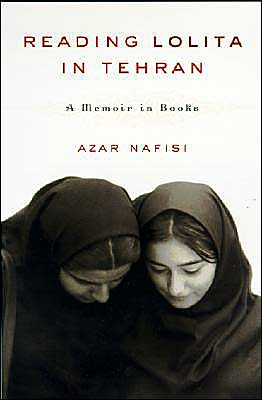Book Notes
 Azar Nafisi, Reading Lolita in Tehran; A Memoir in Books (New York: Random, 2003).
Azar Nafisi, Reading Lolita in Tehran; A Memoir in Books (New York: Random, 2003).
After resigning her teaching post at an Iranian university, in the fall of 1995 Nafisi handpicked seven of her best women students to meet every Thursday morning to discuss literature (her expertise), and in particular how the works of fiction they studied elucidated their social realities. Her living room, she writes, became both a "place of transgression," where Iranian censorship and repression were flaunted and ridiculed, and also a "protective cocoon," where they poured forth their hearts and minds about the degradation of women in Iran. She documents how the Islamic purists harassed, persecuted, imprisoned, tortured and raped women routinely for a very long list of infractions that are hard to believe: running up stairs when late to class, laughing too loudly in public, talking to people of the opposite sex, wearing makeup, drinking alcohol, wearing colored shoelaces and the like. Film (the chief censor was nearly blind, we learn), theater, books, music, jewelry, and even the most casual act were all construed as overtly political and punished accordingly, creating an atmosphere of "perpetual dread." Stonings for adultery and forced, public confessions were not unusual. Nafisi organizes her book around the texts her students read: Lolita, Gatsby, James, and Austen, bearing witness to the revolutionary role that art can play in an individual life and society at large. Nafisi left Iran in 1997, and today teaches at Johns Hopkins University. She takes her place alongside a growing list of brave people who have documented what life is like for women under reactionary Islam (eg, Jean Sasson, Princess (1992, 2001), Latifa, My Forbidden Face (2002), Harriett Logan, Unveiled: Voices of Women in Afghanistan, Sulima and Hala, Batya Swift Yasgur, Behind the Burqa, and the films Khandahar (2001) and Osama (2003)). Nafisi's book has earned universal praise, Bernard Lewis calling it "a masterpiece."


